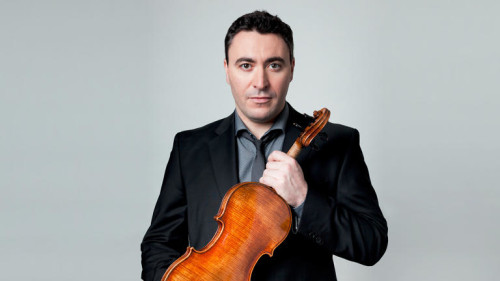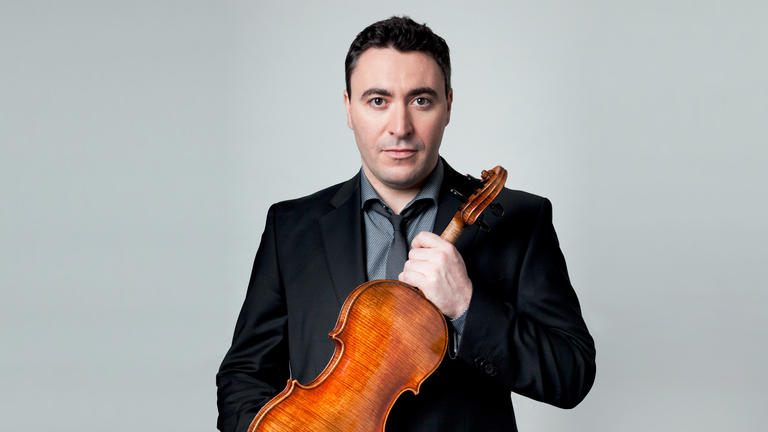 United Kingdom Johann Strauss II, Bruch, Saint-Saëns, Shostakovich: The Würth Philharmonic / Stamatia Karampini (conductor) and Maxim Vengerov (conductor and soloist), Usher Hall, Edinburgh, 3.6.2018. (GT)
United Kingdom Johann Strauss II, Bruch, Saint-Saëns, Shostakovich: The Würth Philharmonic / Stamatia Karampini (conductor) and Maxim Vengerov (conductor and soloist), Usher Hall, Edinburgh, 3.6.2018. (GT)

J Strauss II – Die Fledermaus Overture
Bruch – Violin Concerto No.1
Saint-Saëns – Rondo & Introduction Capriccioso in A minor Op.28
Shostakovich – Symphony No.10
This the last of the Edinburgh concert series features one of the finest violinists in the role of soloist and conductor, an unusual switch from his normal occupation, but a fascinating one as he attempts to assume the role of his predecessors like Oistrakh and Rostropovich in forsaking the bow for the baton. Of interest is the orchestra which is the result of the philanthropist Reinhold Würth in gathering some of the finest virtuosi in a crack ensemble touring the world’s best concert halls. The ensemble seems to employ mostly eastern European musicians with a sprinkling of youth mixed with experienced musicians. The orchestra opened their first season last year and this marked their debut concert tour.
In the Johann Strauss II Die Fledermaus overture, there was a beautiful clarity in the intonation, and a golden bloom in the violins, crystal clear in the wind departments allowing the orchestra to play with a panache and a style all well directed by the young Greek conductor Stamatia Karampini. The high level continued with the arrival of Maxim Vengerov for the Bruch G minor concerto, his mastery was apparent from the first notes despite some lack of accuracy in the brass, but Karampini soon restored the balance by giving the Siberian violinist marvellous accompaniment matching his every argument. The effortlessness of Vengerov’s music-making was sometimes staggering to watch; the note spinning was almost hypnotic. The beauty continued with the Saint-Saëns Introduction and Rondo Capriccioso with all the colours of the south emerging from the Russian’s Stradivarius instrument. Impeccable and magical playing, this was as perfect a performance as one could wish for, in phrasing, music and harmony with great interplay with the orchestra. Vengerov rewarded the capacity audience with a Sarabande (from Bach’s Second Partita).
This was very much a concert of two halves, admittedly I thought it a long shot for Vengerov to come back and undertake one of the 20th century’s great symphonies – not that his conducting technique is in any way faulty – but I would have preferred to see the young Greek conductor give her take on Shostakovich’s Tenth, for she certainly showed prodigious gifts in the first part of the programme.
In the great opening movement, Vengerov adopted a slow tempo but did not achieve the filigree intonation and playing one would expect from a Russian orchestra. Although most certainly the flute of Christina Stefan-Desaga and clarinet of Sandor Deak, were superlative. There was great control too of the dynamic development with excellent playing from the brass, under tight control of this fledgling conductor. In his technique, Vengerov is not demonstrative, no great gestures, everything is minutely observed. In the brilliant scherzo, there was tremendous ensemble playing with all-round excellence, albeit before the end of this five-minute movement, there was inconsistency in tonal playing in the massed violins. The meditative third movement was masterly performed though again there was irregularity in the strings and they lost their way several times, the repeated horn theme was too loudly played, this is supposed to be subdued, as if a remembrance of the composer’s past. The finale was well executed but again, the apparent unfamiliarity with this score led to some imprecision in the violins, but nevertheless this was a fine performance but indicative of an orchestra who have been together only for one year.
One factor which must be mentioned are the excellent programmes which, instead of worthless adverts, are packed with information about the works to be performed (six pages were devoted to the Shostakovich symphony) with a list of all the orchestra members. All credit to the culture committee of the City of Edinburgh for arranging these concerts.
Gregor Tassie
